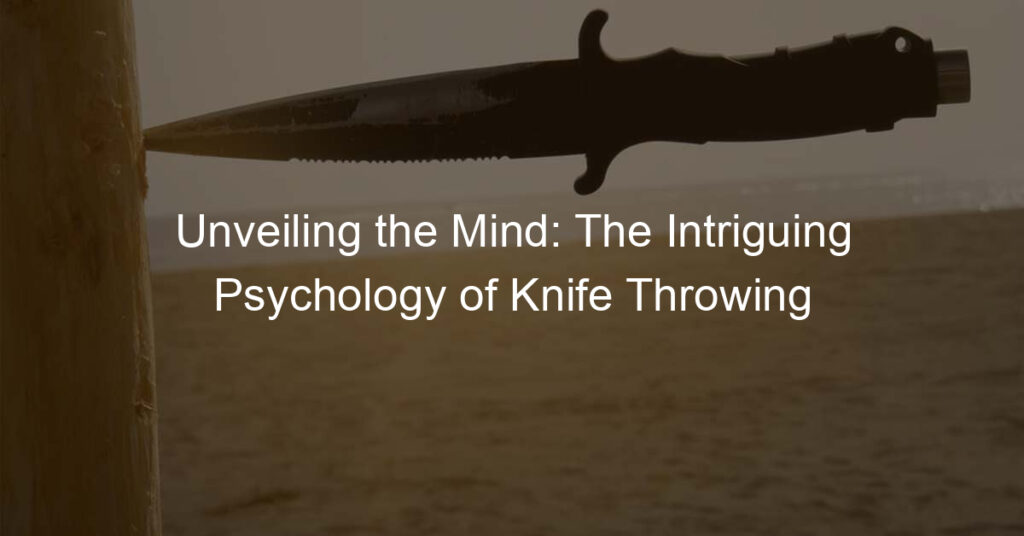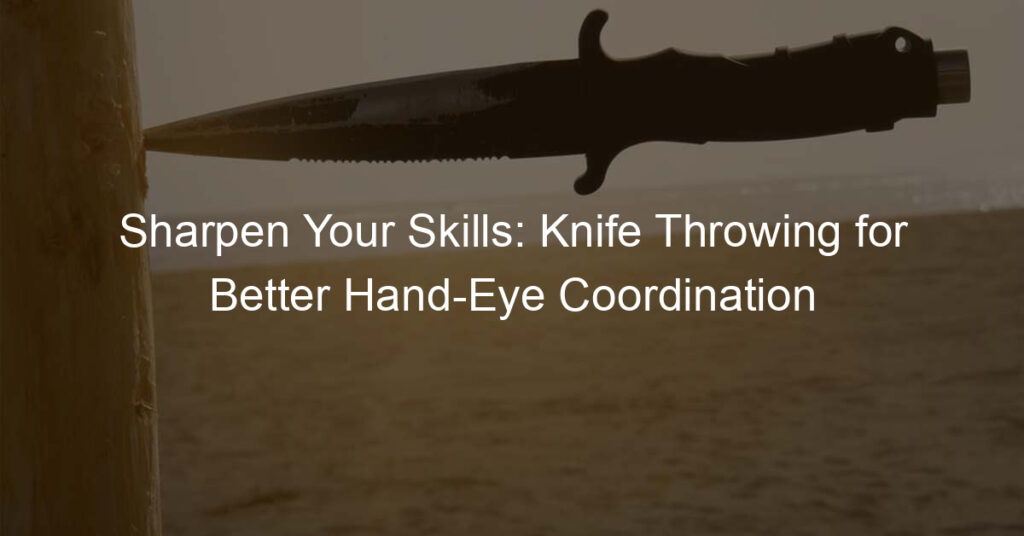Introduction to Knife Throwing Psychology
Knife throwing, a skill often associated with circus performers or action movie heroes, has a deeper psychological aspect that is often overlooked. This article aims to shed light on the fascinating world of knife throwing psychology.
-
- Defining Knife Throwing Psychology
The study of the mental processes and behaviors associated with the art of knife throwing. It explores the mindset, focus, and emotional control required to successfully throw a knife with precision and accuracy. This discipline is not only about the physical act of throwing a knife, but also about the mental preparation and concentration needed to execute the throw effectively.
-
- Importance of Understanding Knife Throwing Psychology
It can help throwers develop a stronger focus, better handle pressure, and improve their overall performance. Furthermore, it can provide insights into the thrower’s personality and mental state, which can be useful in various fields such as sports psychology and behavioral studies.
Psychology Behind Knife Throwing
An ancient art form requires not only physical skill but also a deep understanding of the human mind.
Knife Throwing
Involves exploring its historical roots and examining its modern-day practice. This will give us a clearer picture of the psychological aspects involved.
-
- Historical Perspective
Knife throwing has been a part of human history for centuries. It was initially used for hunting and warfare, but over time, it evolved into a form of entertainment and sport. The psychological aspect of knife throwing was crucial even in the past. Warriors and hunters needed to maintain focus, calculate distances, and control their emotions to throw effectively. This required a high level of mental discipline and concentration, which is still relevant in today’s knife throwing practices.
-
- Modern Day Knife Throwing
Today, knife throwing is a recognized sport with various competitions held worldwide. It requires the same mental discipline as in the past, but the psychological aspect has become even more crucial. Modern knife throwers need to manage their stress levels, maintain focus, and build confidence to perform well. They also need to understand the physics behind knife throwing, which involves calculating distances, angles, and rotations. This requires a combination of mental agility, concentration, and self-belief.
The psychology behind knife throwing involves exploring its historical roots and examining its modern-day practice. It’s a blend of physical skill, mental discipline, and deep human psychology.
Mental Aspects of Knife Throwing
It is not just about physical strength or precision. It also involves a significant mental aspect.
-
- The Role of Focus and Concentration
Focus and concentration are paramount in knife throwing. When you throw a knife, your mind should be clear, and your attention should be solely on the target. Distractions can lead to a missed throw or even an accident. Experienced throwers often enter a state of ‘flow’, where they are fully immersed in the activity, and everything else fades into the background.
Practicing mindfulness can enhance your focus and concentration. Mindfulness involves being fully present in the moment and paying attention to what you’re doing without getting distracted by other thoughts or events. This can help you to aim accurately and throw the knife with the right amount of force.
-
- Importance of Confidence and Self-Belief
If you don’t believe in your ability to hit the target, you’re likely to hesitate or make mistakes. Confidence comes from practice and experience. The more you practice, the more confident you’ll become.
Every thrower misses at times, even the professionals. Don’t let a missed throw shake your confidence. Instead, learn from it and use it to improve your technique. As the saying goes, “Believe you can and you’re halfway there.”
Knife throwing is as much a mental game as it is a physical one. By honing your focus, concentration, confidence, and self-belief, you can become a skilled and successful knife thrower.
Psychological Study of Knife Throwing
Psychology behind knife throwing can be enriched by examining real-life scenarios.
Case Studies
-
Case Study 1: Professional Knife Thrower
John, a professional knife thrower, has been practicing the art for over 15 years. His experience has honed his skills and mental agility. He describes his mindset during a throw as a state of ‘flow’, a term coined by psychologist Mihaly Csikszentmihalyi. This state is characterized by complete absorption in the task at hand, leading to a heightened sense of focus and a loss of self-consciousness. John’s ability to enter this state of flow allows him to perform at an optimal level, throwing knives with precision and consistency.
-
Case Study 2: Novice Knife Thrower
On the other hand, we have Sarah, a novice knife thrower. She has been practicing for only a few months. Unlike John, Sarah often experiences anxiety and self-doubt during her throws. These feelings can interfere with her focus, causing her throws to be inconsistent. Sarah’s case illustrates the psychological hurdles that beginners often face. Overcoming these mental obstacles is a crucial part of becoming proficient in knife throwing.
Key Takeaways from Studies
-
- Insights on Knife Throwing Mindset
The mindset of a knife thrower is one of focus, discipline, and determination. Knife throwing is not just about physical skill; it’s also about mental fortitude. A successful knife thrower must be able to concentrate on their target, block out distractions, and maintain a calm demeanor even under pressure. They must also possess the discipline to practice regularly and the determination to improve their skills.
-
- Psychological Factors in Knife Throwing
Several psychological factors can influence a knife thrower’s performance. These include their level of confidence, their ability to handle stress, and their mental resilience. A high level of confidence can enhance a thrower’s accuracy and precision, while a strong ability to handle stress can help them perform well even in high-pressure situations. Mental resilience, meanwhile, can help them bounce back from setbacks and continue to strive for improvement.
Psychological Perspective on Knife Throwing
Knife Throwing Mental Preparation
-
- Techniques for Mental Preparation
-
-
- Meditation: This helps to clear the mind and focus on the task at hand. It can be as simple as taking a few deep breaths before a throw.
- Positive Self-Talk: This involves encouraging oneself with positive statements like “I can do this” or “I am capable”. This can boost confidence and reduce anxiety.
- Goal Setting: Setting achievable goals can motivate and give a sense of direction. It can be a daily, weekly, or monthly goal depending on the individual’s preference.
- Role of Visualization in Knife Throwing
-
It involves picturing the successful execution of a throw in your mind before actually doing it. This can help to improve focus, reduce anxiety, and increase confidence.
Mental preparation and visualization play a crucial role in knife throwing. They help to improve focus, reduce anxiety, and increase confidence, which are all essential for successful knife throwing.
The Psychology of Throwing Knives
-
- Understanding the thrill and fear
The moment when the knife leaves your hand, spins in the air, and hits the target brings a rush of adrenaline. It’s a feeling of power, control, and accomplishment. But there’s also an element of fear. The fear of missing the target, the fear of the knife bouncing back, and the fear of failure. This combination of thrill and fear is what makes knife throwing so exhilarating and addictive.
-
- Psychological benefits of knife throwing
It has several psychological benefits as well. It improves focus, concentration, and hand-eye coordination. It helps in stress relief and promotes mental well-being. A study found that participants who engaged in knife throwing reported improved mood, reduced anxiety, and increased self-confidence. It’s a form of meditation where you have to be fully present in the moment, blocking out all distractions. This helps in developing mindfulness and mental resilience.
Conclusion: Unveiling the Mind of a Knife Thrower
-
- Summary of Key Points
Knife throwing is not just a physical activity; it requires a high level of mental focus and discipline. The psychology behind knife throwing involves a blend of concentration, precision, and emotional control. We have also learned that knife throwers often use visualization techniques to improve their performance, and that the act of throwing can be a form of stress relief for some individuals.
-
- Final Thoughts on the Psychology of Knife Throwing
It’s not just about the thrill of hitting a target; it’s also about the mental journey that the thrower undertakes. The mind of a knife thrower is a fascinating place, filled with focus, determination, and a unique form of tranquility. This understanding can help us appreciate the sport on a deeper level, and perhaps even inspire us to try it ourselves.







